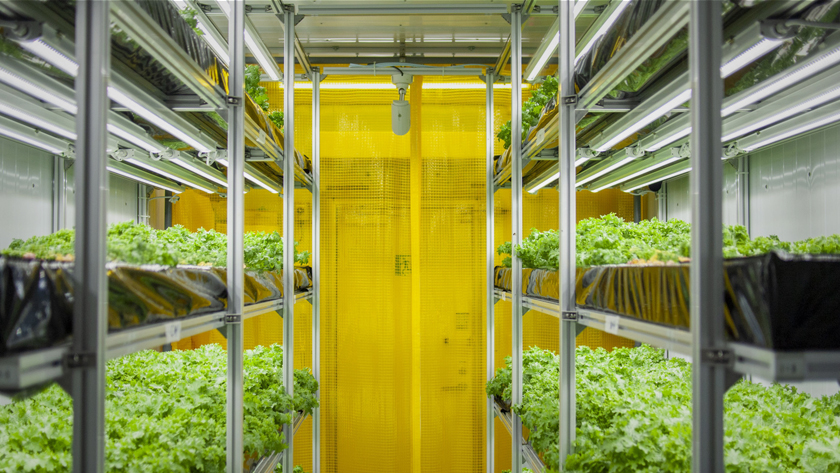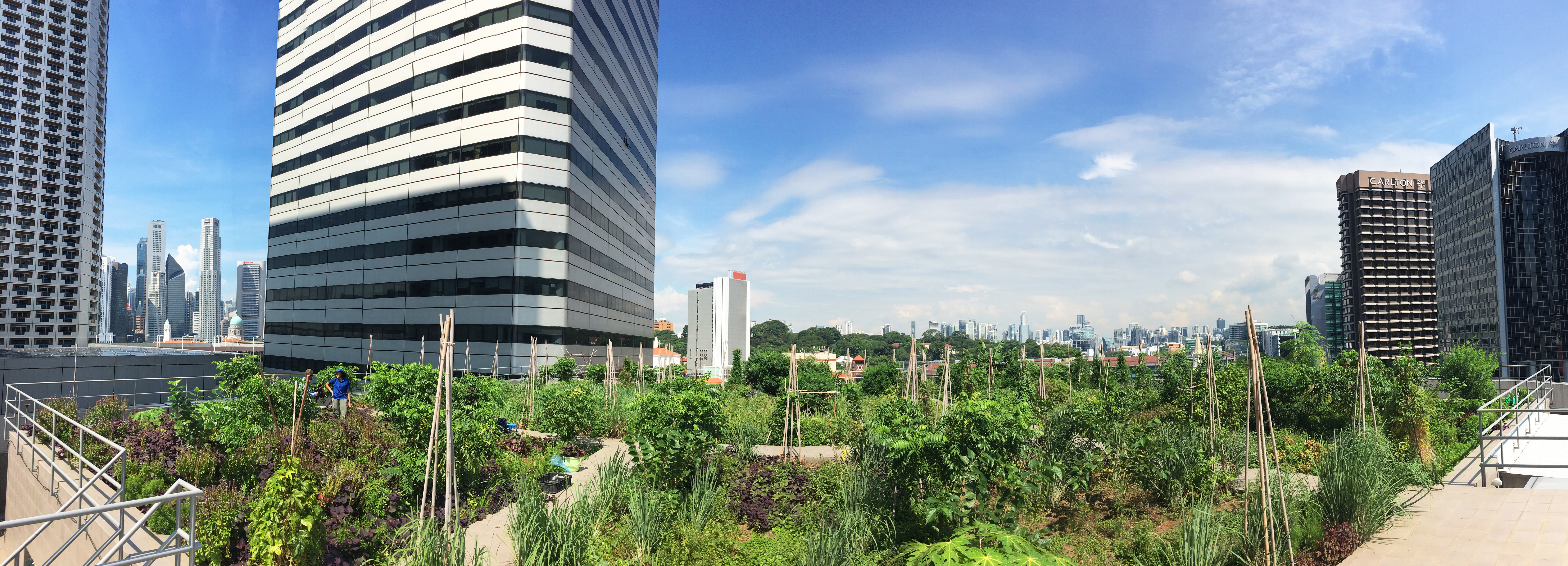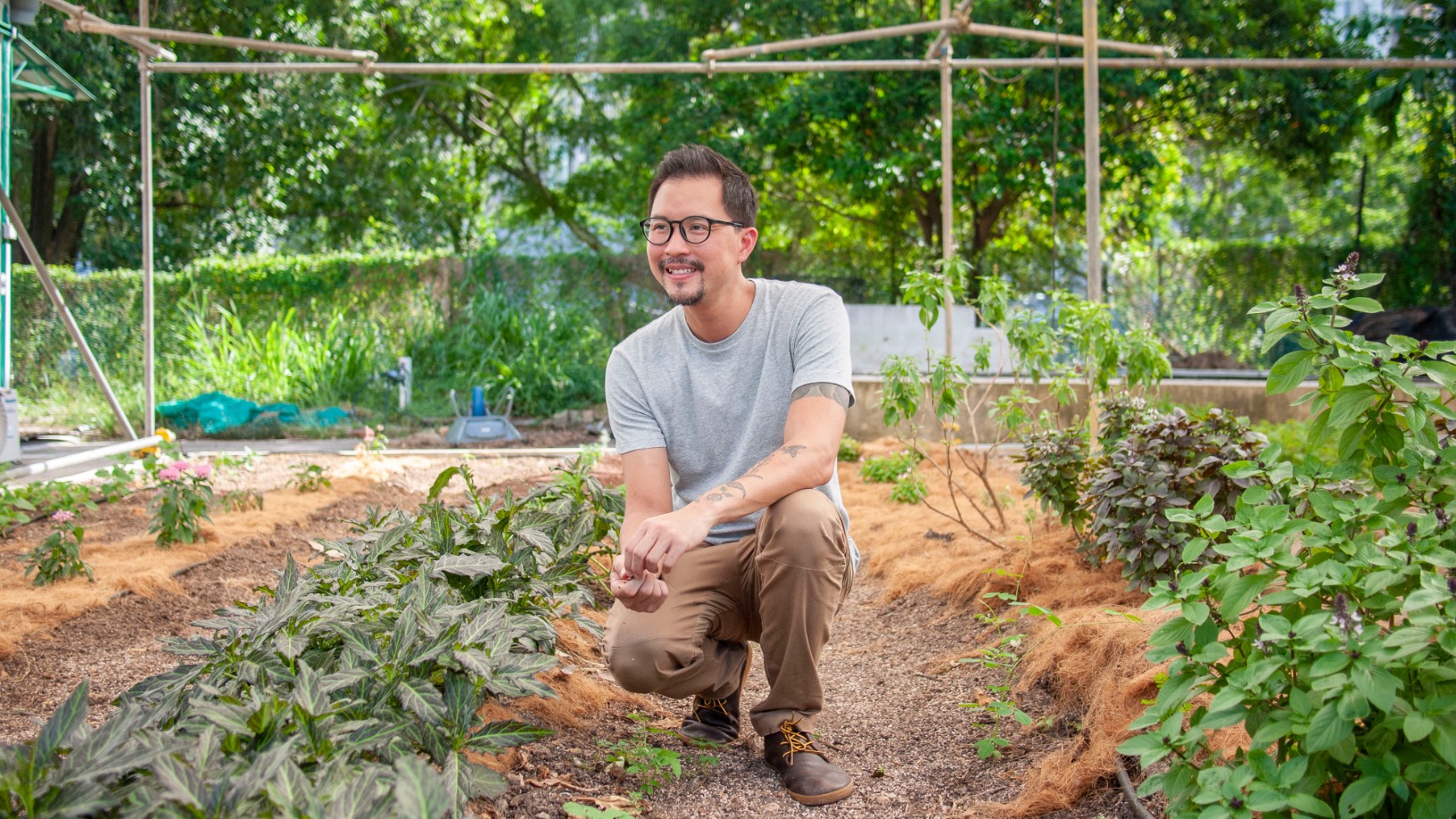With a land area of just 724.2 sq km – less than half of the size of London and a third smaller than Hong Kong – Singapore is better known for its business district skyscrapers than for its bok choy farms. A local farming pioneer has been changing that, dotting the city-island with “edible gardens” since 2012.
The aptly named Edible Garden City (EGC) specializes in growing local vegetables, herbs and other plants that can thrive in Singapore’s hot tropical climate without needing much care. It’s a profitable business, too, and growing. The company has created 240 such gardens to date in all sorts of urban spaces – homes, schools, office rooftops, shopping malls – while supplying restaurants and homes with freshly farmed vegetables.
In doing so, EGC hopes to attract more Singaporeans to support local farming – even trying it for themselves one day – the company’s Head of Customer Relations Sarah Rodriguez said in an interview.
Founded by former adman Bjorn Low and ex-landscape designer Robert Pearce, EGC has its core business in garden design. Under the “Foodscaping” brand, they help clients select plants that are both desirable as food and easy to grow in the Singapore climate, so that beginner and amateur hobby gardeners can maintain their gardens with less effort and with professional support. For clients that cannot commit to do so, EGC also offers maintenance services.
Their clients include upmarket restaurants and hotels such as Huber’s Butchery, The Summerhouse and Marina Bay Sands, which harvest the vegetables and herbs for use in their kitchens. At office buildings, malls and schools, the gardens EGC builds are both decorative and functional: employees and students tend to the garden to learn new skills.
EGC also grows its own vegetables to sell directly to restaurants and consumers, skipping the middleman and helping buyers save on prices. At their base in Queenstown, one of the oldest residential neighborhoods in Singapore, EGC uses a combination of traditional soil-based planting techniques and modern indoor horticulture technology. The company has a partnership with Farmship Inc., a Japanese startup that creates remotely controlled container farming setups.
Local greens lead

Apart from growing plants that their clients specify, EGC also works to promote herbs and greens that are lesser known but equally nutritious and flavorsome. For instance, greens like mani cai (Sauropus androgynus) and ulam raja (Cosmos caudatus) used to be popular, but have fallen out of style in Singapore’s modern cuisine. EGC picks these vegetables because they thrive in the local climate and work well as alternatives to the more popular but harder-to-grow cool-weather crops like kale and lettuce.
“A lot of people get demoralized when they fail to grow something well, but often it's because they try to grow something that wouldn't survive here anyway,” Rodriguez said. She recalled some people had attempted to grow strawberries in hot and humid Singapore -- doomed to fail without a climate-controlled environment and years of experience.
“If you understand the environment and choose the plant accordingly, then you wouldn't need too much attentive care. What we try to do is get [customers] to understand that they can grow some local plants that are equally tasty and nutritious.”
Greens now trendy
Despite a relatively low initial investment of S$10,000, EGC managed to grow quickly. Rodriguez told CompassList that the company first achieved profitability in 2013, just one year after it was founded. Last year it posted revenue of S$1.7m (about $1.24m).
The startup also secured a S$250,000 investment from local lifestyle group Spa Esprit. Today two of the group-owned restaurants, Open Farm Community and NOKA, get their greens from EGC, while the skincare and beauty products used in Spa Esprit’s beauty salons are made from the flowers and herbs found in EGC’s gardens.
When the lockdown started, there was a spike in interest in local vegetables
Key to the company’s rapid growth and financial sustainability has been its diversified business that goes beyond selling produce and building gardens. Until the Covid-19 pandemic put a stop to group gatherings, EGC also ran farm tours and skills workshops, which ranged from basic gardening skills to life skills like sharpening knives and making tapestry out of old clothes.
“Not everybody has access to local produce and not everybody is interested in gardening, so what we try to do is to get them to support urban farming through other ways,” Rodriguez said.
These days EGC continues to engage its customers and aspiring gardeners, but through online channels. The company has its own Instagram IGTV channel Pantry Planting, which teaches viewers how to start growing their own food using tools they likely already have at home. It also resumed selling home-planting kits, a product it had discontinued, when more Singaporeans turned to home gardening during the local “circuit breaker" home confinement from April to June.
“In Singapore, when the lockdown measures were first implemented, there was a spike in interest in local vegetables,” Rodriguez recalled. “We think that seeing the empty supermarket shelves gave some people a sense of agency, wanting to protect themselves from uncertainties.
“Some people just want to learn something new,” she said, noting that many people were “antsy” and needed a way to spend their idle time at home. “But others put a lot of importance to it since they want to secure their family's health and dietary patterns without relying on others.”
Singapore’s food security drive

After fulfilling essential needs like housing and industry, Singapore allocates less than 1% of available land to agricultural uses. This lack of agricultural land space means that Singapore can only produce 13% of its vegetable demand locally, leaving the island-state vulnerable to disruptions in the global food supply chain. Never was such insecurity keener felt than during the first months of the Covid-19 outbreak, when worldwide shipping and freight lines got severely delayed or even stopped entirely.
Even earlier, in 2019, the Singapore government had set a goal to locally produce 30% of the food it needs by 2030, cleverly marketed as “30 by 30.” Urban agricultural businesses like EGC have received much support from the state, and in turn they support this drive. As part of the “30 by 30” goal, EGC and other urban farms have submitted their applications to develop hydroponic farming setups at designated locations around the country.
EGC also wants to promote the concept of “decentralized farms,” or small, community-managed gardens producing edible plants for a neighborhood.
“When people think of traditional farming, they imagine large sprawling fields,” Rodriguez said. “What we're trying to activate are small pockets of space. For example, if you have a bit of space between two apartment blocks, that can be a small farm.”
We try to get customers to understand that they can grow local plants that are equally tasty and nutritious
Another EGC mission is to introduce “therapeutic gardening” to the elderly, people with mental health issues and other marginalized groups. The startup is already working with the Autism Resource Center to employ adults with autism in farming activities. EGC also hires retirees, who Rodriguez says has “decades of gardening experience.” EGC’s plan itself is forecast to be decade-long, and includes the promotion of the community benefits of gardening and agriculture.
While EGC acknowledges that intensive, indoor agriculture is an important part of local food production in land-scarce Singapore, it is also wary of the costs of high-tech farming. “The higher you build a vertical farm, for example, the more electricity we use, and the more expensive it gets to do climate control and manage the system,” Rodriguez said.
“People can grow some of their food themselves to reduce reliance on imports, or activate community gardens in our social spaces. We can balance the need for food production and the community benefits.”












